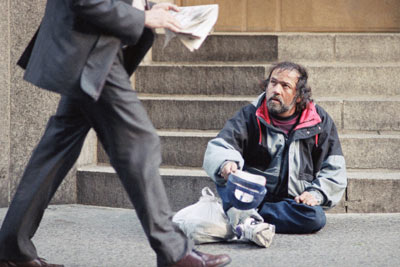Oxfam: Richest 1% will own more than all the rest by 2016
chinagate.cn, January 20, 2015 Adjust font size:

The combined wealth of the richest 1 per cent will overtake that of the other 99 per cent of people next year unless the current trend of rising inequality is checked, Oxfam warned today ahead of the annual World Economic Forum meeting in Davos.
The international agency, whose executive director Winnie Byanyima will co-chair the Davos event, warned that the explosion in inequality is holding back the fight against global poverty at a time when 1 in 9 people do not have enough to eat and more than a billion people still live on less than $1.25 a day.
Byanyima will use her position at Davos to call for urgent action to stem this rising tide of inequality, starting with a crackdown on tax dodging by corporations, and to push for progress towards a global deal on climate change.
‘Wealth: Having it all and wanting more’, a research paper published today by Oxfam, shows that the richest 1 per cent have seen their share of global wealth increase from 44 per cent in 2009 to 48 per cent in 2014, and at this rate will be more than 50 per cent in 2016. Members of this global elite had an average wealth of US$2.7m per adult in 2014.
Of the remaining 52 per cent of global wealth, almost all (46 per cent) is owned by the rest of the richest fifth of the world’s population. The other 80 per cent share just 5.5 per cent and had an average wealth of US$3,851 per adult – that’s 1/700th of the average wealth of the 1 per cent.
Byanyima said, ‘Do we really want to live in a world where the one per cent own more than the rest of us combined? The scale of global inequality is quite simply staggering and despite the issues shooting up the global agenda, the gap between the richest and the rest is widening fast.
‘In the past 12 months, we have seen world leaders from President Obama to Christine Lagarde talk more about tackling extreme inequality, but we are still waiting for many of them to walk the walk. It is time our leaders took on the powerful vested interests that stand in the way of a fairer and more prosperous world.’
Byanyima added: ‘Business as usual for the elite isn’t a cost free option – failure to tackle inequality will set the fight against poverty back by decades. The poor are hurt twice by rising inequality – they get a smaller share of the economic pie and because extreme inequality hurts growth, there is less pie to be shared around.”
Lady Lynn Forester de Rothschild, chief executive officer of EL Rothschild and chairman of the Coalition for Inclusive Capitalism who is speaking at a joint Oxfam-University of Oxford event on inequality today, called on business leaders meeting in Davos to play their part in tackling extreme inequality.
She said, ‘Oxfam’s report is just the latest evidence that inequality has reached shocking extremes, and continues to grow. It is time for the global leaders of modern capitalism, in addition to our politicians, to work to change the system to make it more inclusive, more equitable and more sustainable.
‘Extreme inequality isn't just a moral wrong. It undermines economic growth and it threatens the private sector's bottom line. All those gathering at Davos who want a stable and prosperous world should make tackling inequality a top priority.’
Oxfam made headlines at Davos last year with the revelation that the 85 richest people on the planet have the same wealth as the poorest 50 per cent (3.5 billion people). That figure is now 80 – a dramatic fall from 388 people in 2010. The wealth of the richest 80 doubled in cash terms between 2009 and 2014.